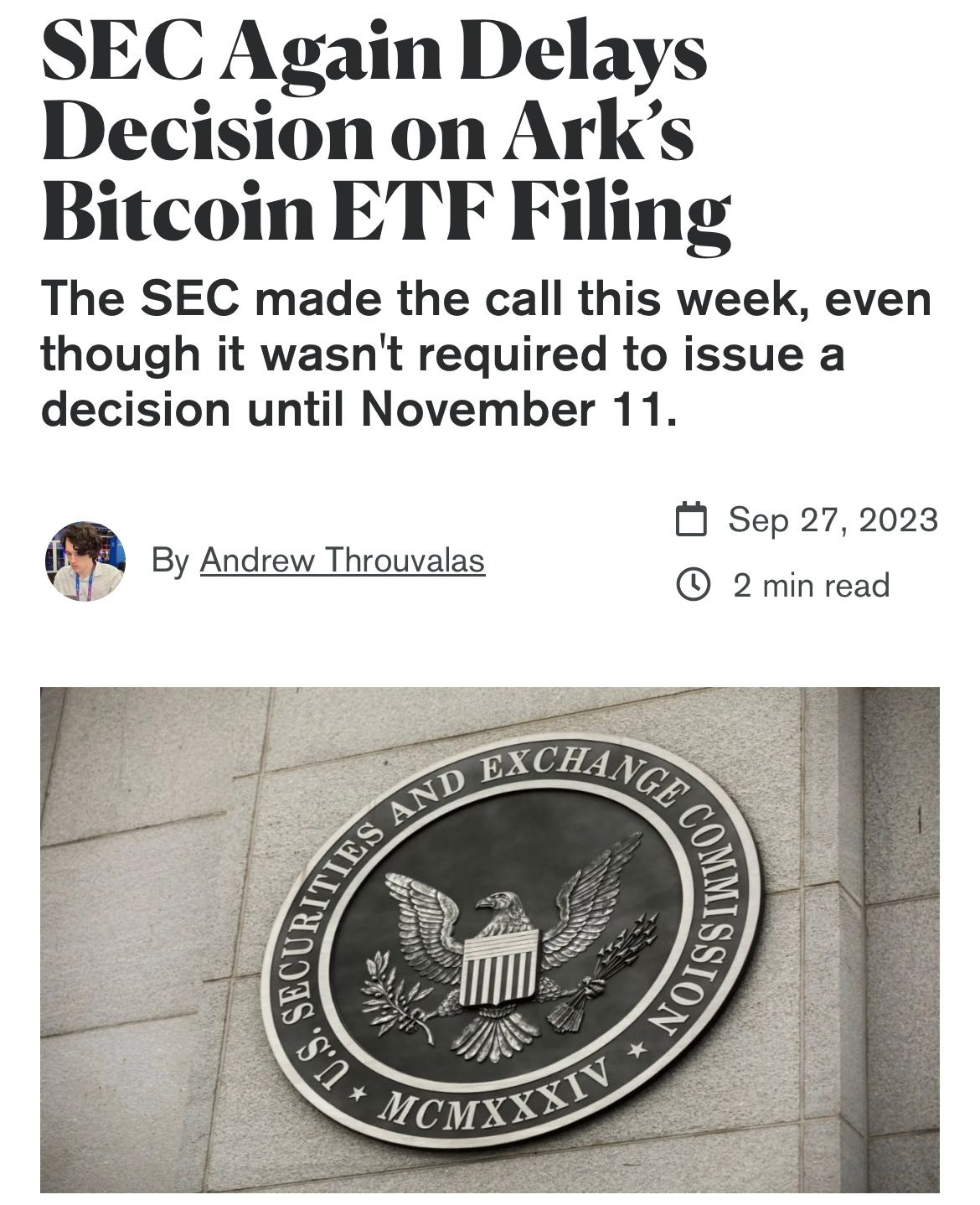Would you want Bitcoin paycheck? 💸
Bitcoin ain't the breadwinner yet. Even crypto pros prefer traditional payday. Binance bids Russia 'Do svidaniya.' Celsius looks for a fresh start. Pudgy Penguins in Walmart.
Hello, y'all. What song are you FEELING right now? Oh yes, you can know that. Find out 👉 ImFeeling
Wanna be a runway model?👇🏻
This is The Token Dispatch 🙌 you can hit us on telegram 🤟
Almost nobody in the crypto industry wants their paycheck in ... well, crypto.
97% say nay to crypto.
Guess Bitcoin still doesn't cut it for grocery shopping.
A new survey reveals the reality 📊
A minuscule 3% of crypto professionals are actually getting their pay in digital assets, based on Pantera Capital's recent Blockchain Compensation Survey.
So, of the 1,600 pros who responded, a whopping 97% said they'd much rather see traditional fiat money in their bank accounts, thank you very much.
For the daring few who do take crypto
USDC is the reigning champ at 56%.
USDT chimes in at 25.
Good ol' bitcoin (BTC) trails at 13%.
Dollar signs: How do the salaries stack up?
Pantera's survey offers a juicy peek into what wallets are looking like across a mix of roles, locations, and company growth stages.
Big bucks for execs: US execs are raking in an average of $147,363 at young seed-stage startups, but those at Series C or further advanced firms? They're pocketing a hefty $335,400 on average.
Engineers: Based on Pantera's research involving a cool 570 engineers, the median global paycheck stands at $120,000. But if you're an engineer stationed in North America, things look even rosier with a salary of $193,000—a neat 1.5% hike from last year. That's notably higher than the estimated $166,100 their counterparts in conventional tech roles pocket.
Marketing and finance pros winning: Marketing experts in the US have a leg up globally, pocketing a median of $135,000 compared to the global average of $100,000.
Business Development whizzes: Business buffs globally are looking at a median base salary of $115,000, but their US counterparts outdo them by pocketing an average of $140,000. And the top dogs? $275,000.
Product Management & Operations: Product pros in the US range from $115,000 in the early stages to $187,500 in senior roles. Operations roles have a decent spread too, with a median US base salary of $110,000, reaching $344,000 for the high rollers.
Law & Order: Given the crypto world's regulatory rollercoaster, legal eagles in senior positions are getting a pretty penny, with a median base of $225,000 and reaching up to $370,000 for the top-tier.
88% of crypto roles are fully remote, which is a stark contrast to the roughly 28% in traditional tech roles.
Given the global dispersion of crypto talent, the report's authors don't see the industry making a mad dash back to the office anytime soon.
What about CBDCs?
Digital Yuan: It was revealed on Apr 24 that Salaries for civil servants in the Chinese city of Changshu will be paid in digital yuan.
This move is expected to boost the implementation of the digital currency in China. The new payment method will include civil servants in state-owned units, public institutions, and public service.
Self-service terminals may also be used for digital yuan settlements.
The city of Changshu has already been familiar with the digital yuan, as some government employees have been receiving subsidies through the central bank digital currency since 2022.
China is also encouraging international businesses to accept the digital yuan as a form of payment.
Digital Rubles: A survey conducted in Lipetsk Oblast, Western Russia, revealed that 90% of respondents do not want to be paid in digital rubles, dealing a setback to the Central Bank's plans for a central bank digital currency (CBDC).
Only 10% said they would be happy to receive their salaries entirely in digital rubles, while 11% would accept partial payment in CBDC coins.
The survey also found that 51% of workers in the region were not ready to switch to digital ruble payments, and 38% were unsure.
However, some sectors, such as administration and finance, showed enthusiasm for the CBDC.
Concerns among respondents included a lack of understanding about how CBDC works, fear of scams, distrust of new technology, and worries about high fees.
TTD Stop Sign 🛑
Binance exits Russia
Binance is packing its bags and leaving the Russian market.
Why?
There are some compliance hiccups. They're not just leaving a void, though; they're handing over their operations to CommEX.
So, while Binance might be saying goodbye, it seems Russian crypto traders will still be in capable hands.
Noah Perlman, Binance’s Chief Compliance Officer.
“As we look toward the future, we recognise that operating in Russia is not compatible with Binance's compliance strategy. We remain confident in the long-term growth of the Web3 industry around the world and will focus our energy on the 100+ other countries in which we operate.”
Chase UK Puts the Brakes
Chase, the retail wing of the banking behemoth JPMorgan, has some news that might just change your trading game.
What's the Deal?
Starting from October 16, Chase UK will be closing its doors to all crypto transactions. That means, if you've got a Chase debit card or account, you're going to have to look elsewhere to get your crypto fix.
Why the sudden change?
Well, it isn't a capricious move. Their primary motive is to keep customers' cash safe and sound. The surge in crypto scams that have targeted UK folks has got the bank on high alert.
The bank's message to its clientele was clear
"If you'd still like to invest in crypto assets, you can try using a different bank or provider instead—but please be cautious, as you may not be able to get the money back if the payment ends up being related to fraud or a scam."
This isn't Chase's first crypto rodeo.
Flashback to 2020, and Chase US found itself in a hot seat with a lawsuit, claiming it slapped extra charges on customers purchasing crypto through their credit cards back in 2018.
While the bank dished out a $2.5 million settlement, they initially defended their stance, saying crypto purchases were "cash-like transactions." The courts, however, didn't buy it.
TTD Numbers 🔢
$2 billion
Cryptocurrency platform Celsius Network's rollercoaster journey might be inching towards a resolution.
Their $2 billion restructuring blueprint has garnered a resounding "thumbs up" from the creditor community.
Celsius Network found more than 98% of its creditor groups supporting the proposed reorganisation strategy, which promises to return a substantial chunk of their investments - between 67% and 85%.
What's in the package? 🎁
Creditors aren't just getting back a slice of their money. They'll also receive equity in a new venture, affectionately dubbed "NewCo" (for now).
This "NewCo" isn't just a reboot of Celsius. It aims to be a platform amplifying Celsius' Bitcoin mining functions, possessing stakes in Ethereum, overseeing asset liquidation from debtors tied up in bankruptcy, and eyeing fresh business avenues.
The players on the field ⚽
The management baton for "NewCo" will be held by the Fahrenheit Group squad. This is the same group that put their money on Celsius Network in May 2023.
It's supported by some influential entities, including Bitcoin mining giant US Bitcoin Corp, venture capital powerhouses Arrington Capital and Proof Group Capital Management, and ex-Algorand CEO Steven Kokinos.
They're bringing the capital, the tech, the team, and ensuring every T is crossed in terms of regulations.
A trip down memory lane
Flashback to October 2021: Celsius Network was strutting its stuff on the global digital asset stage, boasting a cool $25 billion in assets under its wing. Users flocked to deposit their digital treasures and earn interest, while also leveraging their cryptos to borrow money.
But then the crypto skies clouded over.
As the market took a downturn, Celsius found itself filing for bankruptcy. The drama peaked when their former CEO, Alex Mashinsky, faced arrest in July, a year after their business hiccup.
Thankfully for him, he's out on bail now.
Fast forward to today, and we're seeing a shimmer of hope.
The robust approval from the creditors might just steer Celsius Network out of its rocky waters.
But it's not all sunshine and rainbows—the US Securities and Exchange Commission (SEC) isn't too thrilled about Celsius' idea to pair up with Coinbase for their international customer distributions, especially with the SEC's recent lawsuit against the exchange.
Drama, drama, drama.
Where’s ETF?🚨
SEC has once again delayed its decision on approving Bitcoin spot ETF applications, including those from Ark and GlobalX👇🏻
TTD NFTs 🐝
Penguins of Walkmart?
Pudgy Penguins just announced their big break into 2,000 Walmart locations. And just in time for the holiday shopping rush.
Americans can now waddle into their local Walmart (or hop online) and snag one of these cute-as-a-button penguin figures.
Walmart's virtual shelves are lined with customisable penguin outfits, and they've even got the exotic Giraffe-skinned penguins.
Pudgy Penguins CEO, the enthusiastic Luca Netz, was ecstatic
“Walmart’s inclusion of Pudgy Toys in their stores is a testament to the evolution of how consumers engage with brands in the digital era. The team spent years developing the Pudgy brand and fostering our community through social media and the blockchain; we’re thrilled to expand our reach with the support of Walmart.”
Remember the exciting splash they made on Amazon earlier this summer
Those feathery toys netted a cool $500,000 in sales just a few days after their debut. From plush penguin pals to pocket-sized collectibles, the Amazon toy range was an instant hit.
What's Runes?
Casey Rodarmor, the creator of Bitcoin Ordinals protocol, has announced a new fungible token protocol called "Runes."
The Ordinals protocol, which allows for the issuance of meme tokens and NFT-like assets on the Bitcoin blockchain, has been criticised for clogging the network and increasing transfer fees.
Runes aims to address these issues by holding token balances in UTXOs and allowing for transactions with any amount of any number of runes.
What's up in Milan Fashion Week?
Milan Fashion Week featured the debut of the Hoofster, a crowd-sourced designer shoe with a Web3-enabled utility.
Created by indie fashion label AVAVAV and Web3 design studio OnlyEver, the Hoofster represents a new model of co-creation between creative directors and the community.
OnlyEver, a luxury design arm of RubensLuciano, has a strong track record in the footwear industry, working with brands like Versace and Calvin Klein. AVAVAV, led by creative director Beate Karlsson, has gained recognition for its collaborations with fashion icons and celebrities.
The Hoofster is now available for pre-sale and each pair comes with an embedded NFT-linked NFC chip.
TTD AI📍
While ChatGPT had us all jaw-dropping with its human-like chat prowess, there's a fresh face in town that's raising the stakes.
Enter NExT-GPT. This new champ is looking to leapfrog the big guys like Google's Gemini and OpenAI's ChatGPT-Vision by bringing in a stellar combination of text, images, audio, AND video.
What sets it apart
Called the "any-to-any" system.
Can accept and output in any format – text, images, audio, or video.
Creation & development
Collaboration between National University of Singapore (NUS) and Tsinghua University.
OpenSource model, allowing for worldwide tweaks and enhancements.
Technical insights
Employs "modality-switching instruction tuning" for fluid interaction across various input types.
Uses unique tokens for each type of input (image, audio, video).
Only trains 1% of total parameters – a highly efficient design.
AI fusion approach
Combines multiple AI models, acting as an all-in-one super AI.
Achieves the "any-to-any" interaction by fusing multiple capabilities.
Community and availability
Demo site is available for hands-on testing, though access can be intermittent.
As an open-source tool, it provides an alternative for creators in the AI community to innovate.
Spotify's changing stance
Spotify has reversed its decision to ban AI-generated music and is now open to using the technology.
The music streaming service had previously removed an AI-generated song from its platform, but now CEO Daniel Ek says they will take a "nuanced approach" and allow valid uses of AI in music creation.
New feature: AI-powered podcast translation
Spotify will soon pilot an AI-driven voice translation feature for podcasts.
Allows podcasts to be translated into different languages while keeping the original podcaster’s voice.
Official announcement made on September 25.
Initial rollout: Selected podcasts translated into Spanish. French and German translations to follow soon.
TTD Surfer 🏄
Bahrain's Bank ABC has partnered with JPMorgan's Onyx Coin Systems to use blockchain technology for cross-border payments.
Kraken has obtained an Electronic Money Institution (EMI) license from the Central Bank of Ireland and a virtual asset service provider (VASP) registration from the Bank of Spain.
French telecom group Iliad plans to invest millions of euros to develop the country's AI industry.
If you like us, if you don't like us .. either ways do tell us✌️
If you dig what we do, show us love on Twitter, Instagram & Threads🤞
So long. OKAY? ✋















